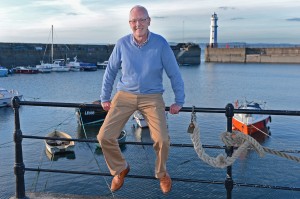 This year (2013) Kenneth Thomson celebrates his 30th anniversary as conductor of Ceòlraidh Ghàidhlig Ghlaschu – Glasgow Gaelic Musical Association, Scotland’s oldest Gaelic choir. Thomson, who has been a member of the choir for 45 years, has consistently directed it to victory at local and national mòds, steering “the GGs”, as they’re fondly known, and their repertoire firmly into the 21st century as the premier Gaelic choir.
This year (2013) Kenneth Thomson celebrates his 30th anniversary as conductor of Ceòlraidh Ghàidhlig Ghlaschu – Glasgow Gaelic Musical Association, Scotland’s oldest Gaelic choir. Thomson, who has been a member of the choir for 45 years, has consistently directed it to victory at local and national mòds, steering “the GGs”, as they’re fondly known, and their repertoire firmly into the 21st century as the premier Gaelic choir.
Born in Campbeltown in 1949, though not to a Gaelic-speaking family (although his father had “a few words”), Thomson attended Dalintober Primary School, Campbeltown Grammar School and Keil School in Dumbarton. He sang in school choirs and when he came to work in Glasgow, joined the Philharmonic Male Voice Choir. When he and his wife-to be, Valerie, were visiting a friend whose father was president of the GGMA, he said that they were short of basses and would Thomson sing with them to perform at the 1968 Mòd. He joined for what was supposed to be six weeks and never looked back.
Clearly motivated by his new Gaelic music environment, he won the Silver Pendant for Gaelic learners at the 1975 National Mòd, then took a crash course and evening classes in Gaelic language. At the 1979 National Mòd it paid off when he won the coveted Gold Medal as a soloist.
In 1980 he was invited to conduct East Kilbride Gaelic Choir, which went on to win the Margaret Duncan Trophy at the Mòd, then in 1983 he was invited to become conductor of his old associates, the GGMA. Nineteen Eighty-nine saw him lead the GGMA to victory in the premiere choral competition in the National Mòd, the Lovat and Tullibardine Trophy. The choir has since scooped the “L &T” a further four times and has come second in all but one of the remaining years since 2001.
During his time with the choir, Thomson has trained or assisted seven Mòd gold medallists and has also recorded three albums with the choir, the last, Slighe an Airgid – “The Silver Way”, marking his 25th anniversary with them. That silver anniversary was also marked by the publication of a similarly titled book containing more than 20 of his Gaelic song arrangements for choirs, quartets and duos, many of which were performed at a memorable concert in Glasgow’s RSAMD (now the Royal Conservatoire of Scotland) by the choir and by a distinguished line-up of singers and musicians, all of them Mòd gold medallists.
In 2004 he released a “solo” album, Seoladh Dhachaigh on which he was joined by such Highland music luminaries as Allan and Ingrid Henderson and Mary Ann Kennedy. He has arranged more than 80 songs for choirs and other vocal combinations, as well as composing some of his own, including waltzes for the weddings of both his children. He runs workshops on choral technique and conducting, and has adjudicated at local and national mòds, as well as at the Pan-Celtic festival in Killarney.
Thomson has achieved this while simultaneously pursuing a career in healthcare management with the NHS. His musical activities overlap into his healthcare work in that he is an “ambassador” for Music in Hospitals and acting chair of the committee which organises the carol concert in aid of the CLIC Sargent charity for children with cancer.
Currently president of the Association of Gaelic Choirs, his non-choral musical commitments have included a spell as project director for the Glasgow Gaelic cultural organisation An Lòchran, which organised the highly successful “Flower of the West” concert tribute to Runrig songwriters Calum and Rory MacDonald. He was also manager and musical director for a project to set Sorley MacLean’s poetry to music, commissioning composers and performers for a series of concerts at events including Celtic Connections and the Blàs Highland festival.
Ask him about his musical influences, and he’ll cite his primary headmaster back in Campbeltown, Hector MacNeill, who taught him his first Gaelic songs when he was seven, Nan Douglas and John MacVicar, who taught him in Glasgow, and, not least, his late wife, Valerie – “a native speaker who claimed not to like Gaelic choirs, but was a great support to me nevertheless”.
As a conductor, he jokes that the only view audiences ever get of him is his backside, but his commitment to the choir and their music is primary. He loves the vast range of Gaelic songs and the potential for putting harmonies to them, and he clearly loves “the GGs”: “My commitment comes from the great folk in the choir and their enthusiasm. I love working with them and, although I may occasionally shout at them, they are a great bunch.”